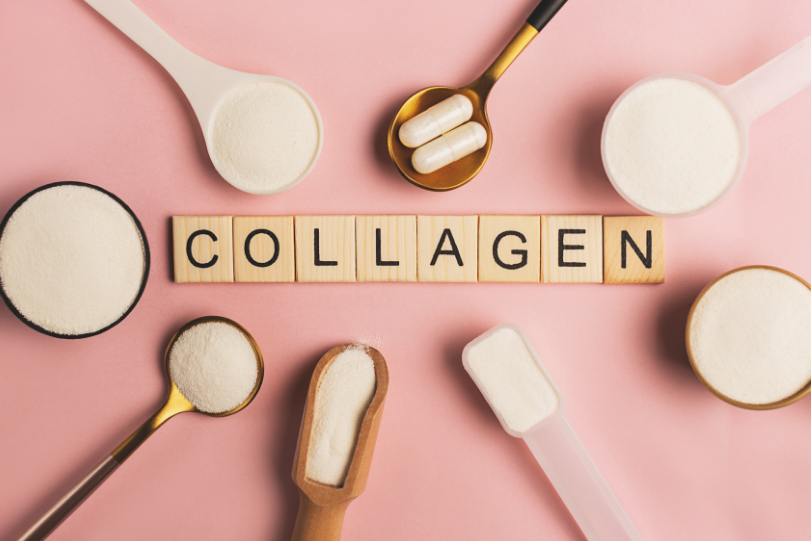
Editorial by Dr. Seiji Aoyagi
General Manager of NiHTEK® Japan
NiHTEK®’s Chief Science Officer (CSO)
- Leading PhD in nutrition from Japan.
- Has been in the industry for over 35 years, both in clinical and sports nutrition and worked for Abbott, GSK and Danone.
- In charge of 3rd party research with key scientists across the globe.
- General Manager of NiHTEK® Japan.
Collagen has become a buzzword in the health, wellness, and beauty industries, touted for its potential benefits in skin health, joint function, and muscle recovery. But does scientific evidence support these claims
Collagen is the most abundant protein in the human body, accounting for about 30% of total protein content. It is a structural protein found in connective tissues, skin, tendons, bones, and cartilage, providing strength, elasticity, and resilience essential for maintaining structural integrity1.
The Digestible Indispensable Amino Acid Score (DIAAS) measures protein quality based on the digestibility of essential amino acids (EAA). Collagen’s amino acid profile differs significantly from high-quality proteins like whey. It is rich in glycine, proline, and hydroxyproline but deficient in EAA such as tryptophan, methionine, isoleucine, and threonine. As a result, collagen has a very low DIAAS—often near zero—because it cannot meet EAA requirements on its own2,3.
Although collagen peptides have shown benefits for muscle recovery when combined with resistance training, they are less effective compared to proteins with higher DIAAS4. (Zdzieblik et al., 2015). Notably, the placebo in Zdzieblik’s study was maltodextrin, which was neither isocaloric nor isonitrogenous, introducing potential confounding variables in the study.
While studies suggest collagen supplementation may support skin health1, joint health5, and bone density6, further research is needed to establish direct, causative benefits. Additionally, it was found that certain bioactive peptides derived from collagen exhibit antioxidant, anti-inflammatory, and antimicrobial properties7. There may be unexplored benefit in collagen but it does not qualify as a high-quality protein.

Given collagen’s low DIAAS, it should not be relied upon as the sole protein source. However, it can complement high-quality proteins rich in EAA, creating a more balanced amino acid profile that supports overall health and protein synthesis.
While DIAAS highlights collagen’s limitations as a standalone protein source, incorporating collagen into a diet alongside high-DIAAS proteins allows individuals to benefit from its unique properties without compromising overall protein quality.
References
- Proksch, E., Schunck, M., Zague, V., Segger, D., Degwert, J., & Oesser, S. (2014). Oral intake of specific bioactive collagen peptides reduces skin wrinkles and increases dermal matrix synthesis. Skin Pharmacology and Physiology, 27(3), 113–119.
- (2013). Dietary protein quality evaluation in human nutrition: Report of an FAO Expert Consultation. FAO Food and Nutrition Paper 92.
- Mathai, J. K., Liu, Y., & Stein, H. H. (2017). Values for digestible indispensable amino acid scores (DIAAS) for some dairy and plant proteins may better describe protein quality than PDCAAS. British Journal of Nutrition, 117(4), 490–499.
- Zdzieblik, D., Oesser, S., Baumstark, M. W., Gollhofer, A., & König, D. (2015). Collagen peptide supplementation in combination with resistance training improves body composition and increases muscle strength in elderly sarcopenic men: A randomized controlled trial. British Journal of Nutrition, 114(8), 1237–1245.
- Clark, K. L., Sebastianelli, W., Flechsenhar, K. R., Aukermann, D. F., Meza, F., Millard, R. L., … & Albert, A. (2008). 24-week study on the use of collagen hydrolysate as a dietary supplement in athletes with activity-related joint pain. Current Medical Research and Opinion, 24(5), 1485–1496.
- König, D., Oesser, S., Scharla, S., Zdzieblik, D., & Gollhofer, A. (2018). Specific collagen peptides improve bone mineral density and bone markers in postmenopausal women—A randomized controlled study. Nutrients, 10(1), 97.
- Bao, X., Liu, F., Ji, S., & Wang, X. (2019). Antioxidant and antimicrobial activities of bioactive peptides derived from marine collagen. Journal of Functional Foods, 57, 295–302.

